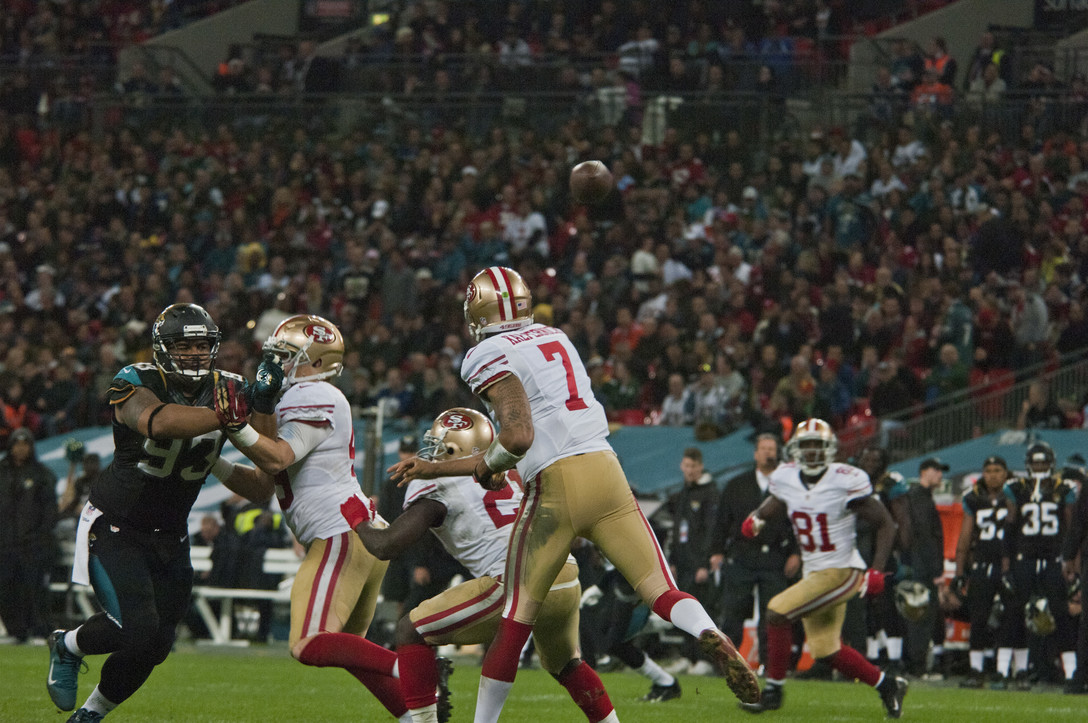Views expressed in opinion columns are the author’s own.
Nike’s decision to make former San Francisco 49ers quarterback Colin Kaepernick the face of their 30th anniversary “Just Do It” campaign has incited a storm of righteous indignation amongst right-wing sportswear owners, owing to Kaepernick’s much-publicized protest campaign during the 2016 NFL season. In turn, some on the left have hailed Nike as a new champion of social justice.
Amid my own genuine happiness for Kaepernick, who surely deserves the chance to spread his message further, and my schadenfreude while watching irate MAGA-ers cut the swooshes off their socks, I am left pondering what the moral implications are of capitalizing on protest for profit.
[Read more: The NFL was political long before Kaepernick took a knee]
To be clear, I’m in no way questioning the good faith or moral fitness of Kaepernick. His charitable work over the tenure of his career and careful media silence preclude any accusation that his actions are or were intended to be self-serving. Moreover, I take as a premise that his protest is justified and on the whole morally good. Rather, I wonder about Nike. To what extent should we laud, or perhaps criticize them?
There is intuition to support both responses. Like I said, I take as a premise that Kaepernick’s protest is a good thing. You might think that, since Nike is supporting the protest, and it’s good to support good things, that Nike is itself doing something good, and should be praised. On the other hand, you might think that because it is clearly intended to make a profit, Nike’s campaign is at best morally neutral, and at worst it is bad in that it taints Kaepernick’s protest with the stench of commercialism.
The enormously influential German philosopher Immanuel Kant can offer some guidance here. Kant famously thought that actions are only morally good if they are undertaken solely out of a sense of duty, and not with any regard for one’s own desires or inclinations. In his landmark work Groundwork of the Metaphysics of Morals, he offers the example of a man who gives to charity simply because he is a “friend of humanity,” and dislikes seeing people suffer. The actions of such a man, Kant argues, are morally worthless, because the man benefits from them. Only the charitable work of a misanthrope who doesn’t care at all about humanity, but helps out of his sense of duty, has moral worth.
The pure Kantian view is admittedly extreme, and not very plausible for most of us. I suspect, however, that many of us accept the similar view that personal gain cannot be the principal factor in motivating morally good actions. Call this the modified Kantian view. For example, we might think that someone who volunteers in soup kitchens just to post about it on social media for attention, and who wouldn’t volunteer without that attention, isn’t actually doing something morally good.
On the modified Kantian view, it is a prima facie possibility for corporations to do moral good, if their primary motivation in taking an action is doing good as opposed to making profit. Consider companies like Patagonia, which takes great pains to minimize the environmental impact of their manufacturing process, or the coffee company Cafédirect, which reinvests up to 50 percent of their profits into the communities their beans are sourced from. Such companies could, in theory, be more profitable if they chose to operate less ethically, so one might think their actions qualify as morally good.
So does Nike’s campaign have moral worth? On this view, it depends on whether or not they are intentionally sacrificing potential profit to do good, and thus we arrive at the central problem of social justice initiatives by otherwise morally questionable corporations: It seems very unlikely that this is the case.
While it’s certainly possible that Nike’s executives had a sudden crisis of conscience with regard to the treatment of people of color in America, it seems much more plausible that their decision to feature Kaepernick was a calculated risk based on careful market research. Nike just last year blocked labor rights experts from assessing the conditions in their factories, and continue to use toxic chemicals in their manufacturing process that can leak into waterways; ethical behavior is clearly not their first priority.
[Read more: Colin Kaepernick’s critics miss the point]
We can and should still celebrate the fact that a black athlete, infamous for his social justice work, is now the face of one of the most popular clothing brands in the world. I have no doubt that he will use his new position to do even more good than before, and perhaps we have Nike to thank for that. But we shouldn’t lose sight of the fact that they are first and foremost a profit-driven corporation, and that seriously harms their credibility as a moral force.
Joey Marcellino is a senior jazz saxophone, physics and philosophy major. He can be reached at fmarcel1@terpmail.umd.edu.



